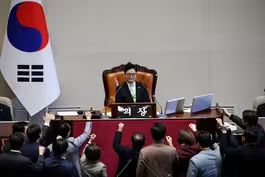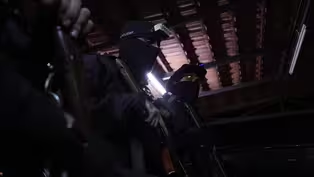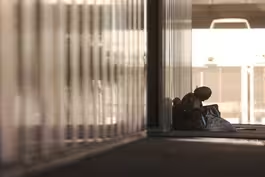
Expert details best ways to prevent house fires
Clip: 12/27/2024 | 6m 49sVideo has Closed Captions
Expert details best ways to prevent house fires as risks rise during winter months
Winter is a time that brings a heightened risk of fires inside the home. The vast majority of those fires can be prevented with some simple steps. Jason Patton is a firefighter and paramedic at Riviera Beach Fire Rescue in Florida and runs the wildly popular YouTube channel “Fire Department Chronicles.” He joined William Brangham to discuss fire safety tips.
Problems playing video? | Closed Captioning Feedback
Problems playing video? | Closed Captioning Feedback
Major corporate funding for the PBS News Hour is provided by BDO, BNSF, Consumer Cellular, American Cruise Lines, and Raymond James. Funding for the PBS NewsHour Weekend is provided by...

Expert details best ways to prevent house fires
Clip: 12/27/2024 | 6m 49sVideo has Closed Captions
Winter is a time that brings a heightened risk of fires inside the home. The vast majority of those fires can be prevented with some simple steps. Jason Patton is a firefighter and paramedic at Riviera Beach Fire Rescue in Florida and runs the wildly popular YouTube channel “Fire Department Chronicles.” He joined William Brangham to discuss fire safety tips.
Problems playing video? | Closed Captioning Feedback
How to Watch PBS News Hour
PBS News Hour is available to stream on pbs.org and the free PBS App, available on iPhone, Apple TV, Android TV, Android smartphones, Amazon Fire TV, Amazon Fire Tablet, Roku, Samsung Smart TV, and Vizio.
Providing Support for PBS.org
Learn Moreabout PBS online sponsorshipLISA DESJARDINS: This is a time of year when families gather from across the country.
But with that also comes a heightened risk of fires inside the home.
There are more home fires in December than any other month.
The vast majority of those blazes, though, can be prevented with some simple steps, like the kind you learn from firefighter and paramedic Jason Patton of Riviera Beach Fire Rescue in Florida.
He runs the wildly popular and irreverent YouTube channel Fire Department Chronicles.
JASON PATTON, Riviera Beach Fire Rescue: Making sure that your family knows what to do in the case of any emergency, but especially a house fire, is just as important as anything else that we can talk about.
And, by the way, you actually have to practice it.
LISA DESJARDINS: Our William Brangham recently spoke with Patton to get some fire safety tips.
WILLIAM BRANGHAM: Jason, such a great pleasure to have you on the "News Hour."
Help me understand this.
Why is December such a big month for fires?
I mean, is it because we're dragging dry, flammable trees into our houses and putting them next to our fireplaces?
JASON PATTON: It definitely -- that definitely doesn't help.
But it's mainly because you're having more people together, or more cooking, but also, during the winter months, it is getting colder.
So more people are turning on their heaters or they're bringing space heaters into the house.
And, sometimes, we don't create the best practices when it comes to those space heaters.
So, increased cold months on top of sometimes overloading the extension cords that we're using, all of those things can contribute to increased fires.
WILLIAM BRANGHAM: So what are some best practices?
Like, if you're going into someone's typical Christmas, overcrowded, bunch of relatives squawking at each other, what -- when you're looking around the rooms and thinking about that, what are best practices?
JASON PATTON: Any time you're going to have space heaters in the home, you want to make sure that there's nothing next to it.
You want to make sure there's no blankets, it's not close to couches or anything like that.
If you are going to cook in your home, please make sure that you have some type of fire extinguisher in the kitchen.
We very much encourage that on every floor of your home, because fires can start anywhere, and then smoke detectors.
Smoke detectors are massive.
The big thing about smoke detectors is, fires spread so quickly through homes today that it is so important that you are alerted, especially if you're sleeping, as quickly as possible, so you and your family members can get out of the house.
WILLIAM BRANGHAM: I have actually read that the amount of time, when that smoke detector goes off, that you have to get out of your house is much shorter now than it was even 20, 30 years ago.
Why is that?
JASON PATTON: Because of the types of items that are inside of the homes.
You know, 30 years ago, most items, most of your furniture, the things that you were bringing into your home, they were made of your typical flammable items, but now plastics.
Plastics and polyesters are infiltrated into our homes, because they look great and they're easier and cheaper to create.
So they're spreading so much faster.
They ignite because they're going to be made of petroleum.
You got about somewhere to the three to four minutes, sometimes even less, to be able to escape your home.
WILLIAM BRANGHAM: Wow.
What about those fire blankets that I have seen all over Instagram, people recommending them?
Are those a good idea?
JASON PATTON: Absolutely, listen, especially when it comes to kitchen fires.
If it's just a typical item that's on fire, then an ABC extinguisher, which is very much recommended for 99 percent of homes, that will work perfectly.
But if it's a grease fire, ABC can work.
But the best thing to do is smother those.
The worst thing you can do with a grease fire is water.
When people put water on the fires, water, once it hits that, it instantly boils and expands 1,700 times its original size.
So you essentially make a small bomb inside of your kitchen and you throw flammable grease balls all over the place.
So, a blanket or -- a fire blanket, fire blanket, specifically, or just putting the lid back on the pot if you're able to do that and wait for it to cool down.
WILLIAM BRANGHAM: Is there a general rule that you would counsel people to say, OK, a fire has broken out in my house, I myself can deal with this with smothering or with an extinguisher, or when I should just say, this is beyond my pay grade and get out?
JASON PATTON: I would say, for anybody, if at any point in time you think, I don't think I can handle this, call 911, get the family out of the house as fast as possible.
As we said, it spreads so incredibly quickly, even when it comes to dry, dry trees, Christmas trees, if you're ever bored, Google that, you will see how quickly that can explode.
But when it comes to -- or as quickly it can spread.
But when it comes to these kitchen fires or any fire in your house, if at any point in time you think, I can't do this, grab your family, get out.
The average response time for firefighters is four to six minutes.
So we have enough time to be able to get there and hopefully stop that fire from spreading throughout your house, but you are the number one most important thing.
WILLIAM BRANGHAM: You often talk about on your channel the fire escape plan.
What is that and why is it important?
How does a family make one?
JASON PATTON: So it's something that you do on a normal day without an emergency.
It's finding a place, teaching your young ones or even your teenagers, whomever it is, how to get out of the house as safely as possible, and try to think up the most scenarios.
I live in a three-story townhome.
If my second floor is on fire, how does my daughter get out of her window?
How do we get escape ladders or whatever it is?
But the most important thing is practicing it, having somewhere outside to meet.
Because, when we show up as firefighters, the first thing we're going to ask, even dispatch is, is there anyone left in the home?
And it's very easy to point at a mailbox or a tree that's outside, and one, two, three, four, everybody is outside.
But practicing it is so important.
WILLIAM BRANGHAM: What about all those holiday decorations that are crowded into our house?
Are there any -- beyond those incredibly flammable Christmas trees, which, as you say, if you have seen them on YouTube going up, it's tremendous pyrotechnics.
What about those other things that we have got in our house?
Anything else there we should be worried about?
JASON PATTON: It's really Christmas lights.
That's the big thing.
And, obviously, candles, as long as they aren't next to anything, they're going to be totally fine.
Don't put candles anywhere near anything that can burn.
But it's -- the number one thing when it comes to Christmas lights is, don't overload your extensions.
Don't overload any cords or any plugs that you're plugging into.
They're safe 99 percent of the time.
But when we overload them, we put a lot of additional power or currency run - - or current running through the extensions.
And that's what tends to catch them on fire.
And make sure you don't have blankets or anything laying on top of the cords themselves, which can create additional heat and start fires.
WILLIAM BRANGHAM: All right, that is Jason Patton of the wonderful Fire Department Chronicles YouTube channel.
Thank you so much for all this great advice.
JASON PATTON: Thank you.
Brooks and Capehart on Trump allies clashing
Video has Closed Captions
Clip: 12/27/2024 | 9m 31s | Brooks and Capehart on Trump allies clashing over immigration policy (9m 31s)
A look at the biggest stories of 2024 through images
Video has Closed Captions
Clip: 12/27/2024 | 6m 21s | A look at the biggest stories of 2024 through the images of photojournalists (6m 21s)
News Wrap: South Korea parliament impeaches acting president
Video has Closed Captions
Clip: 12/27/2024 | 6m 18s | News Wrap: South Korea's parliament impeaches acting president (6m 18s)
Syrian rulers try to calm tensions involving Assad loyalists
Video has Closed Captions
Clip: 12/27/2024 | 9m 15s | Syria's new rulers try to contain growing tensions involving Assad loyalists (9m 15s)
U.S. sees dramatic rise in homelessness among families
Video has Closed Captions
Clip: 12/27/2024 | 6m 28s | U.S. sees dramatic rise in homelessness among families in 2024 (6m 28s)
Providing Support for PBS.org
Learn Moreabout PBS online sponsorship
- News and Public Affairs

FRONTLINE is investigative journalism that questions, explains and changes our world.

- News and Public Affairs

Amanpour and Company features conversations with leaders and decision makers.












Support for PBS provided by:
Major corporate funding for the PBS News Hour is provided by BDO, BNSF, Consumer Cellular, American Cruise Lines, and Raymond James. Funding for the PBS NewsHour Weekend is provided by...




